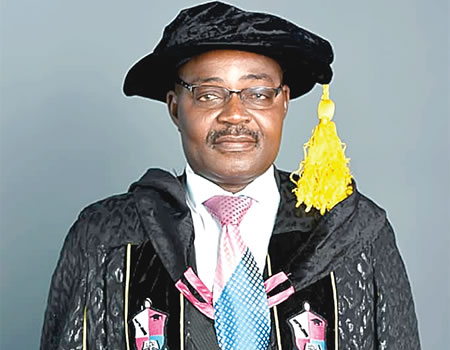It’s been almost over a year since you took the mantle of leadership as vice chancellor. How has it been?
I really thank God for giving me the opportunity. One thing is for one to aspire for a position and another is for God to make it a reality. My background in academics and some sensitive administrative positions I have occupied in the system have assisted me a great deal. It has been a year of bliss. I also have to appreciate the Chancellor\Chairman of Governing Council, Professor Jide Owoeye; the Board of Trustees, the management, staff and students of this institution for the confidence they have in me. The university’s location is a very good advantage for us. We have been able to attract scholars to the university from far and near. We have some of them from the University of Ibadan, Obafemi Awolowo University, University of Lagos, Federal University of Agriculture, Abeokuta, Olabisi Onabanjo University, Ago-Iwoye and Some other Universities in the country. All of these added together have given us a very good edge over others.
In specific terms, what are the things you have been able to do differently since you assumed office?
I have been able to pursue some strategic objectives of the university, with the support of the Council, the Board of Trustees and the management that are to be achieved in the next ten years. We call these ‘the strategic goal. Secondly, I have been able to maintain a very good relationship with the regulatory body, the National Universities Commission (NUC). Before I came on board, the university had a very bitter experience with the NUC; the former executive secretary just wanted to frustrate the university. However, that is now history, the situation is now different. We thank God that the person who is there now is progressive and has been a father to the university. We now have 55 NUC accredited programmes at the first degree, Master’s degree and PhD levels. On July 7, last year, the executive secretary of the NUC, Professor Abubakar Rasheed, visited the university and he was highly impressed by what he met on the ground. We now have Nursing, Physiology, Medical Laboratory, Science Laboratory, Public Health, Anatomy, Nutrition and Dietetics, Estate Management and Architecture – all approved, verified and registered by the NUC. The commission came for accreditation of our PhD programmes in Accounting, Economics, Finance, Business Administration, among others. We also have the intention of introducing some other new programmes in the university such as Forensic Science, Cyber Security, Business Information System, Information Technology, Software Engineering and Mechanical Engineering.
In the last one year, the university also awarded scholarships to deserving undergraduate and postgraduate students. We also have accreditation of BSc Accounting programme by ICAN for another four years. With this accreditation, it means that our students can write ICAN examinations while in school. We had collaborations with some professional bodies like Institute of Chartered Secretaries and Administrators of Nigeria (ICSAN), Chartered Institute of Taxation of Nigeria (CITN) and Chartered Institute of Bankers of Nigeria (CIBN). These will offer our students the opportunity to obtain a double-edged degree: academic MSc with professional certificate of the CIBN. Along the year also, the university has appointed not less than 50 academic and non-academic staff, as well as sponsored staff to conferences within and outside the country. When I assumed this position, we got an award from Seedling Labs in US, an organisation that (supplies) equipment to institutions throughout the world and LCU is among the beneficiaries. We wrote a proposal and it was approved, so the company is giving us equipment that is worth over N300 million to equip our sciences and laboratory. Last year, the vice president, Professor Yemi Oshibajo, came here to inaugurate our ultra-modern university stadium which was of FIFA grade, coupled with a solid sports complex. We have also completed the new hostel block of 120 rooms for our students. Five of our lecturers recently bagged their PhDs from different universities home and abroad, just to mention a few.
ALSO READ: Tony Elumelu Foundation appoints new CEO
Are there challenges?
We have challenges especially in the area of infrastructure development. Now, our enrolments have greatly increased, therefore, we need to increase our hostel and other facilities. We now have some collaboration with some. Some people have come on board to operate what is called Build Operate and Transfer (BoT) with us. We have some on the ground already, which will take some 15 to 25 years, after which the ownership will come to the university.
There have been calls for the Federal Government to extend government funding to private universities. Where do you stand?
I agree. We all know that the Federal Government is responsible for financing federal universities, but since the benchmark for accreditation and admission are the same throughout Nigeria for either federal, state or private university, students who choose to attend private universities too should be able to enjoy some basic things from the federal government. Private universities are owned by private individuals or organisations, so one would not say that the government should be responsible in financing them, but what we are saying is that government should encourage and create an enabling environment for students who don’t have the opportunity to attend federal universities. It can give them a scholarship. We have some of these students who are brilliant. Why can’t the government sponsor them or create a scholarship loan board to enable them to borrow money to attend private universities? The government should provide basic amenities for higher institutions to be viable.
One of the ways to know if a university is really there in terms of the international connections is the number of international students and collaborations it is able to attract. What is the ratio like in LCU?
Earlier in the year, we had collaborations with some institutions. We believe it’s not only in having foreign students, but also in research, teaching and output. It’s your outputs that will speak for you, and we thank God that our students are doing excellently well. We have so many international students. As at this time last year, we had some visiting professors who came from the United States to the Faculty of Law; another one is also coming before the end of the year. The issue is that some of these international scholars are scared of insecurity problem in the country. Many of them have shown interest in coming. During the last conference we had, about one-third of the participants were from abroad; that was in July. It was a conference on science, technology and the emancipation of girls. When it comes to the issue of attracting people, we have attracted a lot of scholars from South Africa, Kenya, Ghana, Gambia, and so forth. Some of our lecturers have been to South Africa for conference, where they contributed immensely. The university has a very good future and we believe that at least our research and training development will yield positive results. This, among many other things, has been giving us a very good pedigree. It’s also not only about the international base; the local also matters. We believe there is need for collaborations and affiliations with some local reputable organisations too. We have with the University College Hospital; our students use UCH for their ‘Clinicals.’ Our Faculty of Law also has collaboration with the Faculty of Law in the University of Ibadan.
Recently, the university announced itself as having the best Law Faculty in Nigeria. Where did that come from?
I have never seen a Faculty of Law that is as vibrant as that of Lead City University. The library is well-stocked with recent journals and books; the facilities are superb. This has attracted a lot of students. Apart from the Faculty of Law’s library, there is a part of the major library that has to do with Law too. We also have a courtroom where our students do their practice; it’s called a moot court. Lead City University is a university to beat in terms of quality academic staff and physical infrastructure. We are the first private university in Ibadan with high-quality teaching facilities and we expose our students to global perspectives, independence and self-reliance.






